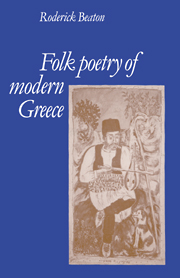Book contents
- Frontmatter
- Contents
- Preface
- Maps
- 1 INTRODUCTION
- 2 THE DEMOTIC TRADITION: THE SONGS
- 3 STRUCTURE OF THE DEMOTIC TRADITION: THE FORMULA
- 4 STRUCTURE OF THE DEMOTIC TRADITION: IMAGERY AND THEMES
- 5 THE EMERGENCE OF THE DEMOTIC TRADITION
- 6 FUNCTION OF THE DEMOTIC TRADITION: THE SONGS AND HISTORY
- 7 THE SONGS AS MYTH
- 8 ONE TRADITION OR SEVERAL?
- 9 THE HISTORICAL TRADITION
- 10 GREEK FOLK POETRY AND WRITING
- Notes
- Glossary of Greek words transliterated in the text
- Bibliography
- Index
5 - THE EMERGENCE OF THE DEMOTIC TRADITION
Published online by Cambridge University Press: 13 September 2009
- Frontmatter
- Contents
- Preface
- Maps
- 1 INTRODUCTION
- 2 THE DEMOTIC TRADITION: THE SONGS
- 3 STRUCTURE OF THE DEMOTIC TRADITION: THE FORMULA
- 4 STRUCTURE OF THE DEMOTIC TRADITION: IMAGERY AND THEMES
- 5 THE EMERGENCE OF THE DEMOTIC TRADITION
- 6 FUNCTION OF THE DEMOTIC TRADITION: THE SONGS AND HISTORY
- 7 THE SONGS AS MYTH
- 8 ONE TRADITION OR SEVERAL?
- 9 THE HISTORICAL TRADITION
- 10 GREEK FOLK POETRY AND WRITING
- Notes
- Glossary of Greek words transliterated in the text
- Bibliography
- Index
Summary
It has generally been the practice, among scholars seeking to unravel the historical problems associated with Greek folk songs, to treat individual songs as special cases and either to extrapolate a hypothetical archetype for the song, or to discover ancient or medieval parallels from which songs are supposed to be derived. If the analysis of the nature and structure of the tradition in the last two chapters is accepted, the value of this line of arguing is limited. The songs of Yannis, reprieved from death on condition that his bride will lend him half the years of her life (Politis, N. G., 1909, pp. 250–1), and of Mavrianos, making a wager on his sister's chastity (Petropoulos, 1958, pp. 110–12) are most likely related respectively to the Alcestis story and a tale in the Decameron. But each of these stories has been retold by (presumably) generations of singers whose thought and expression were governed by considerations quite different from those which affected Euripides and Boccaccio. The point is that if a folk tradition is admitted to have been a creative process involving its own conventions and expectations, then we can no longer regard transmission as the progressive corruption of an original text. This is as true if the original is supposed to have been borrowed from literary tradition or to have been invented.
- Type
- Chapter
- Information
- Folk Poetry of Modern Greece , pp. 74 - 89Publisher: Cambridge University PressPrint publication year: 1980

